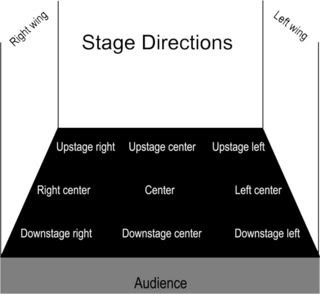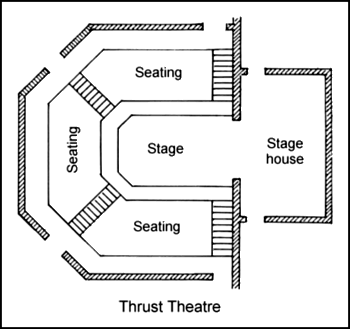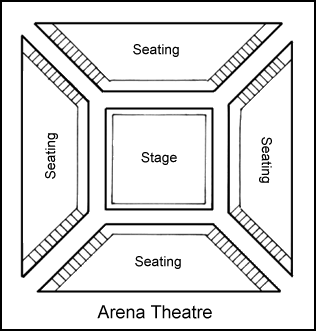Want to know what's the low-down with all that theatrical gibber? Here is a glossary of the most common theatre lingo!Acoustics: The science of sound, specifically how sound travels and reverberates in theatres. Echooo.
Acting Bug: Slang term used when someone has been infected with a great desire to be an actor. Raid has no effect.
Actor: (Actress, Thespian, Drama geek, etc.) A person who performs on stage, television or movies.
Actor-proof: A play that will work, however bad the acting; or a prop that cannot be broken by an actor.
Adlib: Improvised or made-up lines not part of the script.
Alternative theatre: Not in mainstream theatre, politically or artistically progressive. Or just plain on crack.
Amateur Actor: A newbie, noob, new, inexperienced, innocent, virgin performer.
Anti-timing: When an actor is too slow or too fast in responding to action or dialogue. They probably aren't good at telling jokes.
Apron: In proscenium theatre, stage area downstage the proscenium arch.
Audition: The opportunity for an actor to display their talents when seeking a role in an upcoming production. The scariest experience you will ever have, and those who are crazy enough to go to every audition they possibly can are masochists.
Backstage: The entire area behind the stage of a theatre.
Blackout: Extinguishing all stage lights to mark the end of a scene or play.
Blocking: Stage movements by actors, including entrances and exits. In Improv theatre, blocking may also mean when an improviser doesn’t accept an offer to progress the scene.
Box Office: Ticket selling department. Kiss up to them and you can dib the good seats.
Breaking-up: (Break character), Out-of-place laughter by an actor on stage. Such amateurs.
Bus-and-Truck Tour: A low budget tour of a play or musical, often presented for only a few nights in smaller cities. AKA Ghetto tours.
Call Back: A request that an actor return for an additional audition. Usually a good thing!
Call Time: The time an actor’s services are needed. Be there or be murdered.
Casting Couch: Sexual harassment of actors and actresses.
Cattle Call: An audition open to anyone, regardless of experience. By anyone they mean people, not cows.
Centre Stage: The centre of the performing area or stage.
Character Role: A supporting role with pronounced or eccentric characteristics.
Cheating: Appearing to look at a fellow actor, but actually facing slightly downstage to enable the audience to hear and see the actors better.
Chemistry: A mysterious element that creates excitement when two actors appear together.
Chew the Scenery: Overact or exaggerate.
Cold Reading: Performing, or reading a scene at an audition without having read it beforehand. No pressure.
Costume: Clothes worn by the actors on stage. Or, lack of clothes...
Cue: A line of dialogue, action, or sound, on or offstage, that tells an actor it is time to enter, exit, move, or speak.
Curtain Up: The start of a performance, whether or not an actual curtain exists in front of the stage.
Cuts: Lines of dialogue in a printed script left out of a production.
Cyc: (Pronounced ‘sike’) Cyclorama; Cloth or cement surface around the entire back of the stage or set.
Dark: A theatre with no show in performance.
Diaphragm: The lower part of the lungs that fills to abdominal space, used by actors and singers to breathe correctly on stage. It's a muscle, so don't pull it. It hurts.
Diction: Clear, sharp pronunciation of words.
Director: The person charged with staging a production, and coordinates all onstage aspects and performances. They're either inspiring or Nazis.
Double-take: An exaggerated facial response to another actor’s words or actions, usually used for comic effect.
Downstage: The area of the stage closest to the audience. Don't fall off.
Dress Rehearsal: A rehearsal in full costume, sets, props, lighting and effects, usually a day or two before the production is shown to a paying audience.
Dresser: A person from Wardrobe department who helps actors in and out of their costumes. They are saviors.
Duologue: A play involving a cast of only two people.
Ensemble: A cast working as equals. No showstopping divas.
Equity: Short term for the main stage actors’ union, Actors’ Equity Association.
Finding your light: An actor’s ability to sense if they are properly placed in respect to stage lighting. If your lighting sense are tingling, you should move closer to the light.
Flop: A theatrical production that fails to draw an audience.
Front of House: the audience part of the theatre.
Full House: No seats available, a sold out show.
Green Room: A room or area where actors can 'chill out' before the show.
Ham: An actor who gives a very exaggerated performance. Also called ‘Hamming up.’ If you'd prefer not to sugar it up, you can also refer to them as Pigs instead.
Head shot: Actor’s eight-by-ten-inch publicity photograph.
Hold the book: To prompt, especially when running lines.
House: The audience, and auditorium.
In-the-round: A theatre production in which the audience is seated on all four sides of the central stage.
Legs: Narrow drapes at the side of the stage, masking the wings.
Limelight: Powerful, movable spotlight; normally an electric arc light.
Levels: The levels created by actors on stage, such as standing, sitting, kneeling, lying down.
Makeup: Any material used to heighten or change an actor’s appearance on stage.
Mannerisms: Gestures, facial expressions, and vocal tricks that an actor uses again and again in different roles.
Method Acting: An internalized form of acting that uses personal experiences from an Actor’s life to help produce on stage emotion.
Mimicry: An actor’s ability to sound or look like someone else.
Monodrama: A one person play.
Monologue: A long speech said by only one actor.
Off-book: When an actor knows their lines and no longer needs their script.
Pace: The speed at which a scene is played.
Pan: A very bad review from a critic.
Pausing for effect: A deliberate pause within lines, used by an actor to call special attention to a moment.
Principle: Main character.
Professional: A seasoned veteran, experienced, knowledgeable, practiced performer.
Stage picture: The image visible to the audience that the actors and props create, usually best with multiple levels.
Places, everyone!: The warning given by the stage manager that a performance is about to begin.
Presence: An actor’s ability to command attention onstage.
Projection: An actor’s ability to use their voice so that it can be clearly heard at the back of the theatre; also used in reference to the emotions an actor wishes to convey. PROJECT!
Prompt: To give an actor a line they forgot.
Props: Any movable object used by an actor during a performance.
Proscenium stage: The classic theatre arrangement, with a curtained stage facing an audience on one side.
Raked stage: A tilted performing area, with its upstage space raised higher than the downstage space.
Rave: An extremely good review from a critic.
Read-through: When actors read the entire play aloud while seated.
Rehearsal: The period during which the actor’s performances are developed and perfected by repetition.
Resume: The printed record of an actor’s experience.
Review: A theatre critic’s version of what they experienced while watching the production.
Run: To practice scripted dialogue without movements; or the number of consecutive performances of a play.
Run-through: To rehearse a whole section without stopping.
Season: A group of plays announced in advance.
Set: The physical design of the stage area within which the actors perform; or to make permanent the way in which a scene is being played.
Showmance: A romance between actors in a production. Not usually a good idea, considering if you break up, the show must go on!
Sides: Pages containing only the lines and cues for one actor, instead of an entire script.
Stage left: The side of the stage that is to the actor’s left as they face the audience.
Stage right: The side of the stage that is to the actor’s right as they face the audience.
Strike: (Or striking the set) Taking down a set at the end of the run of the play.
Tableau: Frozen stage action.
Thrust stage: A stage that projects outward, with the audience seated on three sides. Doesn't involve hips at all, sorry.
Triple threat: A performer skilled at acting, singing and dancing.
Typecasting: Assigning a role to an actor on the basis of their surface appearance or personality.
Typed-out: The elimination of an actor during auditions because of obvious features such as height, weight, or age.
Understudy: An actor who is second in line to perform a role, and is ready to perform if the regular actor is ill.
Upstage: The rear area of the stage farthest from the audience; or an actor’s attempts to distract the audience’s attention from what another actor is doing. Bastard.
Walk through: To perform a role at less-than-usual intensity, such as during a tech rehearsal.
Wings: Spaces at the sides of the stage, normally out of the audience’s sight. Not involving a bird whatsoever.
Any other popular term you'd like to know? Comment below!



